I was born at Shrewsbury [in Shropshire, which lies in western England and borders on northern Wales] February 12th, 1809, and my earliest recollection goes back only to when I was a few months over four years old, when we went to near Abergele [a resort town on the north coast of Wales] for sea-bathing, and I recollect some events and places there with some little distinctness.
|
Susannah Darwin
(1765–1817) |
My mother [Susannah Darwin, daughter of the industrialist Josiah Wedgwood I] died in July, 1817 [facts point to a gastrointestinal illness, probably a cancer], when I was a little over eight years old, and it is odd that I can remember hardly anything about her except her deathbed, her black velvet gown, and her curiously constructed work-table. In the spring of this same year I was sent to a day-school [run by Reverend George Case, minister of the local Unitarian Chapel, which Mrs. Darwin had regularly attended with the young Charles and the rest of her children¹] in Shrewsbury, where I stayed a year.
[Charles Darwin's father, Dr. Robert Waring Darwin (1766–1848), was a wealthy physician.² His own father, Erasmus, had been the friend of Charles' other grandfather, Josiah Wedgwood. This connection led to the marriage of Charles' parents. As Desmond and Moore (1991, p. 11) comment, "Marriage for the Darwins, like everything else, was managed by old Erasmus…they wed in April, 1796, a year after Josiah's death." With her, Susannah brought a £25, 000 inheritance.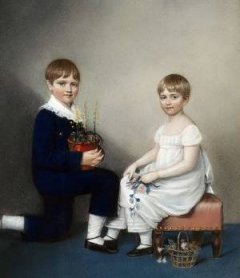 bout 10 shillings a week. Today, a laborer in the U.S. makes around $400 in the same period of time, so Susannah Darwin's inheritance was the equivalent of about $20, 000, 000 today.] bout 10 shillings a week. Today, a laborer in the U.S. makes around $400 in the same period of time, so Susannah Darwin's inheritance was the equivalent of about $20, 000, 000 today.]
|
Charles Darwin with his sister Catherine (1816)
Portrait by Ellen Sharples |
I have been told that I was much slower in learning than my younger sister Catherine [Emily Catherine Darwin, 1810–1866], and I believe that I was in many ways a naughty boy.
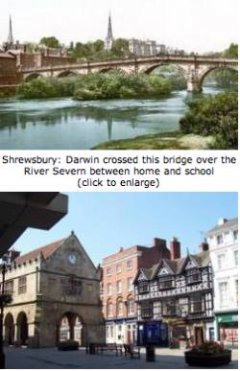 By the time I went to this day-school my taste for natural history, and more especially for collecting, was well developed. I tried to make out the names of plants, and collected all sorts of things, shells, seals, franks, coins, and minerals. The passion for collecting which leads a man to be a systematic naturalist, a virtuoso, or a miser, was very strong in me, and was clearly innate, as none of my sisters or brother ever had this taste. By the time I went to this day-school my taste for natural history, and more especially for collecting, was well developed. I tried to make out the names of plants, and collected all sorts of things, shells, seals, franks, coins, and minerals. The passion for collecting which leads a man to be a systematic naturalist, a virtuoso, or a miser, was very strong in me, and was clearly innate, as none of my sisters or brother ever had this taste.
One little event during this year has fixed itself very firmly in my mind, and I hope that it has done so from my conscience having been afterwards sorely troubled by it; it is curious as showing that apparently I was interested at this early age in the variability of plants! I told another little boy (I believe it was [William Allport] Leighton, who afterwards became a well-known lichenologist and botanist), that I could produce variously coloured polyanthuses and primroses by watering them with certain coloured fluids, which was of course a monstrous fable, and had never been tried by me. [Leighton, who went to school with Darwin at Rev. Case's school, remembered Darwin bringing a flower to school one day and saying his mother had told him you could find out a plant's name by looking inside its blossoms. Leighton told Darwin's son Francis, "This greatly roused my attention and curiosity, and I inquired of him repeatedly how this could be done?"3 — but, of course, Darwin was never able to explain.] I may here also confess that as a little boy I was much given to inventing deliberate falsehoods, and this was always done for the sake of causing excitement. For instance, I once gathered much valuable fruit from my father's trees and hid it in the shrubbery, and then ran in breathless haste to spread the news that I had discovered a hoard of stolen fruit.
|
Shrewsbury Square
(click to enlarge) |
|
|
| The Mount, about 1860 |
I must have been a very simple little fellow when I first went to the school. A boy of the name of Garnett took me into a cake shop one day, and bought some cakes for which he did not pay, as the shopman trusted him. When we came out I asked him why he did not pay for them, and he instantly answered, "Why, do you not know that my uncle left a great sum of money to the town on condition that every tradesman should give whatever was wanted without payment to any one who wore his old hat and moved [it] in a particular manner?" and he then showed me how it was moved. He then went into another shop where he was trusted, and asked for some small article, moving his hat in the proper manner, and of course obtained it without payment. When we came out he said, "Now if you like to go by yourself into that cake-shop (how well I remember its exact position) I will lend you my hat, and you can get whatever you like if you move the hat on your head properly." I gladly accepted the generous offer, and went in and asked for some cakes, moved the old hat and was walking out of the shop, when the shopman made a rush at me, so I dropped the cakes and ran for dear life, and was astonished by being greeted with shouts of laughter by my false friend Garnett. I can say in my own favour that I was as a boy humane, but I owed this entirely to the instruction and example of my sisters. I doubt indeed whether humanity is a natural or innate quality. I was very fond of collecting eggs, but I never took more than a single egg out of a bird's nest, except on one single occasion, when I took all, not for their value, but from a sort of bravado.
I had a strong taste for angling, and would sit for any number of hours on the bank of a river or pond watching the float; when at Maer [at the house of his uncle, Josiah Wedgwood II] I was told that I could kill the worms with salt and water, and from that day I never spitted a living worm, though at the expense probably of some loss of success.
|
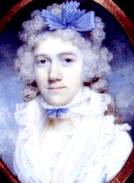

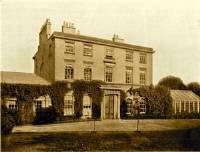
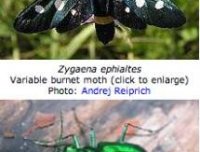
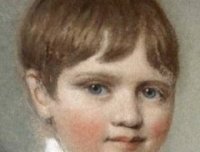

 bout 10 shillings a week. Today, a laborer in the U.S. makes around $400 in the same period of time, so Susannah Darwin's inheritance was the equivalent of about $20, 000, 000 today.]
bout 10 shillings a week. Today, a laborer in the U.S. makes around $400 in the same period of time, so Susannah Darwin's inheritance was the equivalent of about $20, 000, 000 today.] By the time I went to this day-school my taste for natural history, and more especially for collecting, was well developed. I tried to make out the names of plants, and collected all sorts of things, shells, seals, franks, coins, and minerals. The passion for collecting which leads a man to be a systematic naturalist, a virtuoso, or a miser, was very strong in me, and was clearly innate, as none of my sisters or brother ever had this taste.
By the time I went to this day-school my taste for natural history, and more especially for collecting, was well developed. I tried to make out the names of plants, and collected all sorts of things, shells, seals, franks, coins, and minerals. The passion for collecting which leads a man to be a systematic naturalist, a virtuoso, or a miser, was very strong in me, and was clearly innate, as none of my sisters or brother ever had this taste.





